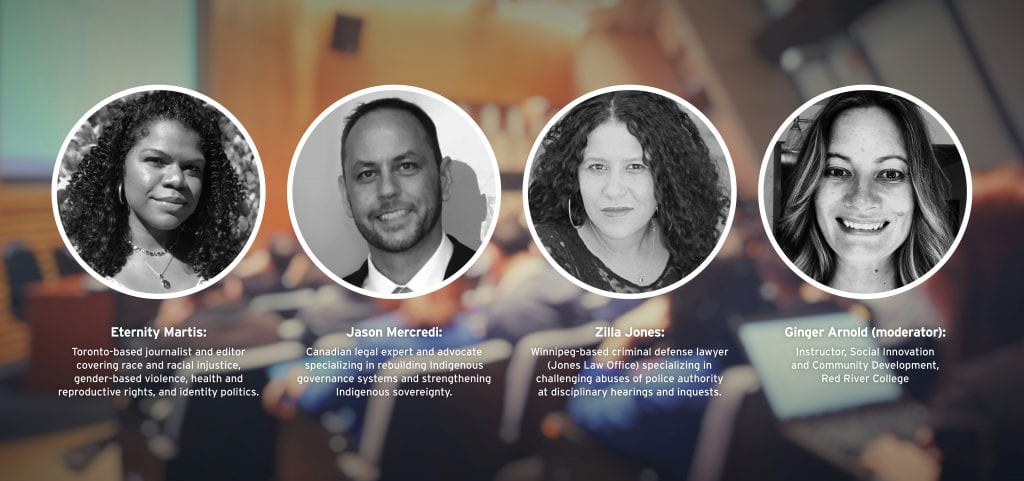College hosts dialogue on anti-racism in higher education
Racism continues to lurk in college classrooms and decision-making tables, but there are steps we can take as organizations and individuals to make our campuses safer and more welcoming for all members of our community.
That was the resounding takeaway from last Wednesday’s virtual platform discussion, Anti-Racism: A Dialogue about Transforming Higher Education, hosted by RRC and the Red River College Students’ Association. (You can watch a recording of the event here.)
Over 300 RRC students and staff participated in the online event. The discussion was led by panelists from across the country who brought diverse experiences, insights and perspectives to a lively and wide-ranging conversation about what post-secondary institutions — and the people who work and study there — can do to combat racism.
The large turnout reflected a high level of commitment to anti-racism as acts of intolerance and hatred continue to rise around the world, says Melanie Gudmundson, Chief Human Resources Officer at RRC.
“We’ve done a lot as a college to create policies and initiatives that protect and support the diversity of our students and staff, because that diversity — and the different points of view it brings to our College — are one of our greatest strengths. Our goal for this event is to hear some of those voices and inspire further, concrete action. There is still much work to do. The number of people who turned out for the event shows how high a priority this is for our community as a whole.”
Conversations about racism are never easy, she adds, but they’re essential to creating space for change.
“We may not know how to start the conversation, or what to say, but silence is not an option.”
Priyanji Mediwake, RRC’s Diversity and Inclusion Specialist and one of the event’s organizers, says some of these actions are already underway, including the recent launch of a new Equity, Diversity and Inclusion strategy, and recruitment plans to ensure greater diversity at the College and BIPOC (Black, Indigenous, and People of Colour) representation among senior, mid-level and front-line leaders.
“RRC’s new Diversity Champions team, which includes staff and faculty representation from each School and Department across the College, is another first step to enhancing conversations and actions.”
Leading the panel were Eternity Martis, an award-winning Toronto-based journalist; Jason Mercredi, whose work helps rebuild Indigenous governance systems; and Zilla Jones, a Winnipeg criminal defense lawyer who specializes in challenging abuses of police authority.
Martis, who is author of They Said This Would Be Fun, a book about race, campus life, and growing up, began by describing her experiences with racism as a person of colour on a predominantly white campus. She outlined a number of strategies colleges can take to support BIPOC staff and students, from zero-tolerance policies towards racism across all institutions, and race-based data collection to better understand the needs and challenges of BIPOC communities, to dedicated resources, services, supports and spaces for those experiencing racism.
Mercredi, who is of Misipawistik Cree Nation and Ininnu descent, talked about his experience as one of two Indigenous law students at Queen’s University. He called upon schools to create space for learning styles, academic timetables and assessments that align with Indigenous cultural values.
“We need to honour Indigenous ideas of education: learn our culture, ceremony, medicines, and own the intellectual property to those things.
Jones encouraged colleges and universities to offer more events, programs and training that immerse all staff and students in diverse perspectives and educate more people about how racism works and the impact it has on those who experience it. She suggested instructors receive solid training in how to deal with racism in class discussions.
“The onus shouldn’t be on a BIPOC student to speak up. The onus should be on the institution to take action.”
Panelists also addressed questions about how people can be stronger activists and allies, and stand up to racist attitudes and comments.
The event’s moderator, Social Innovation and Community Development instructor Ginger Arnold, told participants that Wednesday’s dialogue was not a one-time event for Red River College, but the beginning of ongoing conversations and activities aimed at transforming Red River College into an anti-racist post-secondary institution.
Staff and students interested in working in future anti-racism working groups are encouraged to contact diversity@rrc.ca.
Event organizers also compiled resources and readings to help participants explore next steps in their own anti-racism journey.

